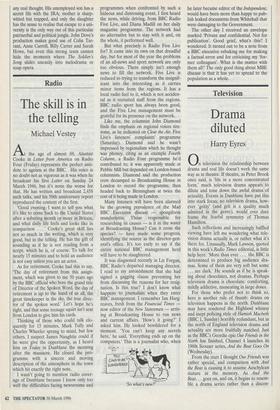Radio
The skill is in the telling
Michael Vestey
Athe age of almost 88, Alastair Cooke in Letter from America on Radio Four (Friday) represents the perfect anti- dote to ageism at the BBC. His voice is no doubt not as vigorous as it was when he broadcast his first Letter on Sunday 24 March 1946, but it's none the worse for that. He has written and broadcast 2,458 such talks, and his 50th anniversary report reproduced the content of the first.
'Good evening. I want to tell you what it's like to come back to the United States after a sobering month or more in Britain, and what daily life feels and looks like in comparison . . . ' Cooke's great skill lies not so much in the writing, which is very good, but in the telling. He has the gift of sounding as if he is not reading from a script, which he is, of course. To talk for nearly 15 minutes and to hold an audience is not easy unless you are an actor.
As for retirement, Cooke had this to say, 'The day of retirement from this assign- ment, which was given to me 50 years ago by the BBC official who bore the grand title of Director of the Spoken Word, the day of retirement is up to the hand of us all, the great timekeeper in the sky, the true direc- tor of the spoken word.' Let's hope he's right, and that some teenage squirt isn't sent from London to give him his cards.
Thinking of those who could talk elo- quently for 15 minutes, Mark Tully and Charles Wheeler sprang to mind, but few others. I suspect James Naughtie could if he were give the opportunity, as I heard him on Today in Dunblane the morning after the massacre. He closed the pro- gramme with a sincere and moving description of the atmosphere in the town which hit exactly the right note.
I wasn't going to mention radio cover- age of Dunblane because I know only too well the difficulties facing newsrooms and programmes when confronted by such a hideous and distressing event. I first heard the news, while driving, from BBC Radio Five Live, and Diana Madill on her daily magazine programme. The network had no alternative but to stay with it and, on the whole, it performed well.
But what precisely is Radio Five Live for? It came into its own on that dreadful day, but for most of the year the problems of an all-news and sport network are only too obvious. There simply isn't enough news to fill the network. Five Live is reduced to trying to transform the insignif- icant into the interesting as it carries minor items from the regions. It has a local radio feel to it, which is not acciden- tal as it recruited staff from the regions. BBC radio sport has always been good, and the Five Live management must be grateful for its presence on the network.
Like me, the columnist John Diamond finds the emphasis on regional voices tire- some, as he indicated on Clear the Air, Five Live's listeners' complaints' programme (Saturday). Diamond said he wasn't impressed by regionalism which he thought was phoney, citing as an example Fourth Column, a Radio Four programme he'd contributed to; it was apparently made at Pebble Mill but depended on London-based columnists. Diamond said the production crew decamped to Broadcasting House in London to record the programme, then headed back to Birmingham at twice the cost of it being made in London.
Many listeners will have been alarmed be the growing prevalence of the Mad BBC Executive disease — spongiform mandarinitis. Those responsible for researching its causes — is it in the water at Broadcasting House? Can it cross the species? — have made some progress, identifying the source as the director-gen- eral's office. It's too early to say if the entire national BBC management herd will have to be slaughtered.
It was diagnosed recently in Liz Forgan, BBC Radio's departed managing director. I read to my astonishment that she had signed a gagging clause preventing her from discussing the reasons for her resig- nation. Is this true? I don't know what happens to journalists when they enter BBC management. I remember Ian Harg- reaves, fresh from the Financial Times — now editor of the New Statesman — arriv- ing at Broadcasting House to run news and current affairs. 'How's it going?' I asked him. He looked bewildered for a moment. 'You can't keep any secrets here,' he said, 'Everything ends up on the computers.' This is a journalist who, when 'So what's new?' he later became editor of the Independent, would have been more than happy to pub- lish leaked documents from Whitehall that were damaging to the Government.
The other day I received an envelope marked 'Private and confidential. Not for publication'. Good grief, what's this? I wondered. It turned out to be a note from a BBC executive rebuking me for making a factual error and for criticising my 'for- mer colleagues'. What is the matter with them all? The only good thing about MBE disease is that it has yet to spread to the population as a whole.


























































 Previous page
Previous page